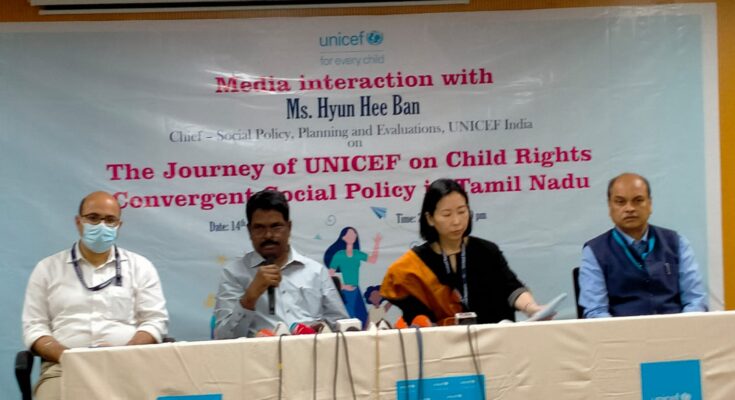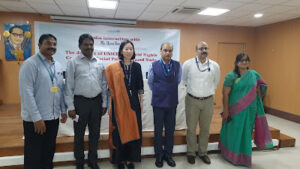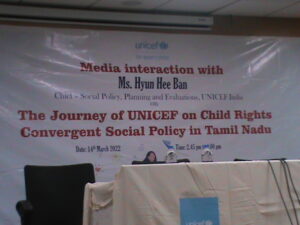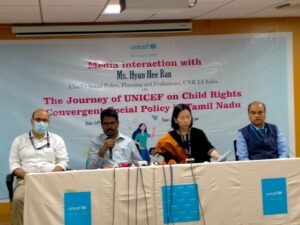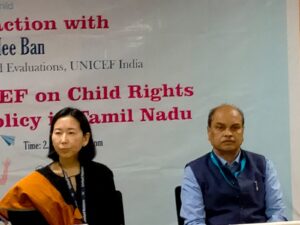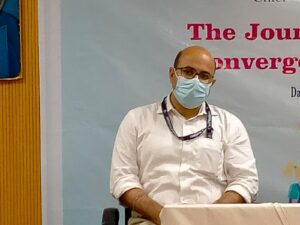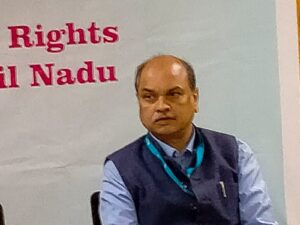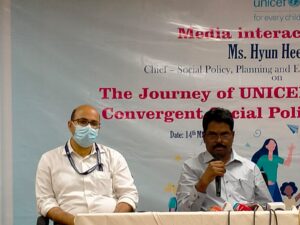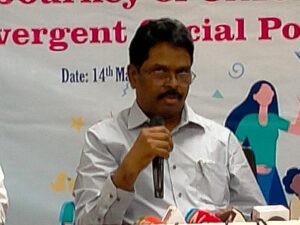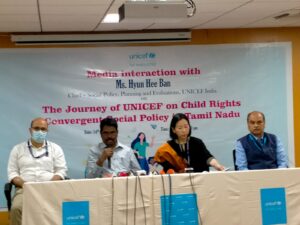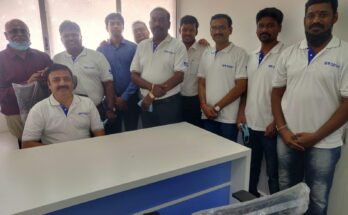The Journey of UNICEF on Child Rights & Convergent Social Policy in Tamil Nadu
Literacy rate is high in Tamil Nadu because of schemes like noon meal programme, lauds UNICEF India Chief Hyun Hee Ban
Chennai, March 14, 2022: UNICEF will contribute to the formation of the “Tamil Nadu State Child Protection Academy” to be set up to protect the rights of children, said Ms. Hyun Hee Ban, head of its India division. She said the academy would be one of the two major projects of the State Social Welfare Department.
Mr.Annadurai, ADG, PIB; Ms.Hyun Hee Ban, Chief – Social Policy, Planning & Evaluations; K.L.Rao, Chief of Social Policy Tamil Nadu & Kerala; Kaushik Ganguly, Social Policy for Child Survival; Subha, Co-ordinator
She said UNICEF was formulating an integrated social policy for children’s rights for the next five years and would meet with Central and State government officials to seek their views.
She interacted with reporters today (14.03.2022) at Shastri Bhavan in Chennai. She pointed out the need for co-ordination and co-operation between the Social Welfare Department, the Judiciary and the Police in protecting the rights of children. She added that the involvement of the School Education Department in the protection of children is still needed. She also said she planned to create awareness among the media in reporting on crimes against children and sexual harassment.
(2nd from left) Mr.Annadurai, ADG, PIB; Ms.Hyun Hee Ban, Chief – Social Policy, Planning & Evaluations; K.L.Rao, Chief of Social Policy Tamil Nadu & Kerala; Kaushik Ganguly, Social Policy for Child Survival; Subha, Co-ordinato r Stating that Tamil Nadu is high in literacy rate due to schemes like the nutritious noon-meal programme, Ms. Ban said the Education Department is implementing programmes to improve the skills of students in grades 9 to 12 with the help of UNICEF.
Ms. Ban, who later responded to questions from reporters, said Covid-19 pandemic had created problems in educating children. She said it was necessary to make unique arrangements in all the states of India to rectify this. Otherwise, she said, there could be a huge gap in learning among children.
She lauded the Government of Tamil Nadu for its excellent work in administering the corona vaccine and said it was commendable that the Central and State Governments had worked together to make vaccine awareness reach the masses.
Climate change is causing the worst impact and we are taking necessary steps to address it, she said while responding to a question on whether India was the fifth most affected country by climate change. She also said she would meet the Chief Secretary to the Government of Tamil Nadu to discuss the next phase of UNICEF’s plans.
Shri. K. L. Rao, UNICEF Office Head, Social Policy Scheme, Tamil Nadu, Kerala, and Kaushik Ganguly, Social Policy for Child Survival, were present at the press conference.
Earlier, Additional Director General of the Press Information Bureau, Chennai and Regional Outreach Bureau Shri. M. Annadurai recalled that PIB and UNICEF had jointly conducted public awareness campaigns during the Covid-19 period. He also pointed out that this cooperation was a model for other states.
Key Highlights of Ongoing and Recently concluded Programs in Tamil Nadu
A) UNICEF in Tamil Nadu is partnering with the Department of Social Welfare, in two key areas of support which includes development of “Tamil Nadu State Child Protection Academy’ for responsive child protection services and strengthening of five-year plan on alternative Care and de-institutionalization programme;
B) With the Department of Education, UNICEF has partnered and supported on several important schemes and programs like the career guidance program “Naan Mudhalvan”, life skills education for children in 09-12 standa rds across the state and the adoption of adolescent responsive school guidelines in school management and major government schemes and programs;
C) UNICEF has partnered with the Directorate of Public Health and Preventive Medicine and the National Hea lth Mission in supporting key health programs of national priority like Routine Immunization and COVID19 Vaccination, roll-out of strategic risk communication and community engagement for COVID19 and COVID19 vaccination; undertaken capacity building and gap assessments for system strengthening for primary health care and community-led health approaches;
D) In partnership with the Department of Rural Development and Panchayati Raj, UNICEF has supported the implementation of national programs like Swachha Bharat Mission and supported intensified community en gagement on the goals and objectives of SBM across the state.
Sectoral/Programmatio Focus Areas:
Child Survival: a) Maternal and Neonatal Health; b) Immunization, o) Child and Adolescent Health, d) Strengthen ing of Health Systems and Services and e) Community Engagement for Behaviour and Social Change;
Child Protection: a) Strengthening of Child Protection Systems to prevent all forms of violence, exploitation, ab use, neglect and harmful practices; b) Mental health and psychosocial support (MHPSS); c) Unaccompanied and separated children (UASC), and d) Community Engagement for Behaviour and Social Change;
Education: a) Equitable access to learning; b) Safe learning environments, c) Mental health and psychosocial su pport (MHPSS); d) Strengthening of education systems and e) Community Engagement for Behaviour and Social Change;
Social Protection: a) Support and strengthen social protection systems; b) Access to social transfers, c) Com mun ity engagement and Accountability to Affected Population (AAP); d) mobilize and monitor public financing for Children (PF4C);
WASH: a) Safe and equitable access to water for drinking and domestic purposes, b) Promote access and use of appropriate and safely managed sanitation facilities, c) WASH in institutions like education and health facilities; d) Hygiene promotion and community engagement;
